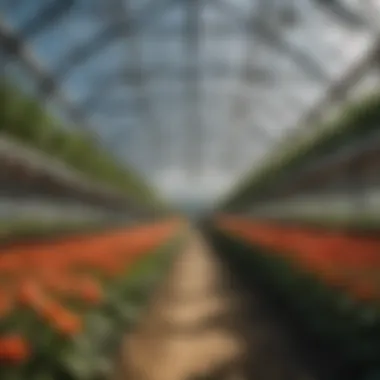Top Plant Jobs in Agriculture with High Salaries


Overview of the Topic
The agriculture sector, particularly the plant domain, presents diverse career opportunities. The increasing global demand for sustainable food production and environmental stewardship leads to a rise in relevant job openings. This segment explores significant roles within this field, highlighting their importance and potential earnings.
Definition and Importance
Jobs in plant agriculture encompass positions focused on the cultivation, breeding, and management of plant species. These roles play a crucial part in food security, biodiversity, and environmental sustainability. As the population grows, there is an urgent need for experts in plant science and horticulture, creating a dynamic job market for skilled individuals.
Current Trends
Current trends in the field include a shift toward sustainable practices, precision agriculture, and genetically modified crops. These areas show positive growth potential, as companies look for professionals who can adapt and innovate within fast-evolving agricultural technologies. The integration of data analytics, artificial intelligence, and biotechnology is becoming common, pushing demand for qualified experts in these areas.
Key Techniques and Practices
To thrive in plant agriculture, understanding key techniques and practices is essential. Professionals often need knowledge of research methods, cultivation practices, and equipment usage.
Step-by-Step Guide
- Education and Training: Acquiring a degree in agronomy, horticulture, or plant biology is crucial.
- Specialization: Focus on specific sectors, such as plant breeding or pest management.
- Gain Experience: Internships or practical training provide hands-on experience in the field.
- Networking: Building connections with industry professionals can open new job opportunities.
Tools and Equipment Needed
Successful plant practitioners utilize various tools, including:
- Soil testing kits
- Precision farming technology
- Plant growth regulators
- Pest control solutions
Challenges and Solutions
Working in plant agriculture comes with its unique set of challenges that professionals must navigate.
Common Obstacles
Some common challenges include:
- Climate change impact on crop yields.
- Pest resistance to traditional control methods.
- Limited access to advanced technology in some regions.
Innovative Solutions
Addressing these challenges requires innovative solutions such as:
- Developing climate-resilient crop varieties.
- Implementing integrated pest management strategies.
- Advocating for policy changes that support agricultural innovation.
Overview of Plant Jobs
The study of plant jobs within agriculture is vital in understanding how different roles contribute to food security, environmental conservation, and economic stability. Plant jobs encompass various professional opportunities that focus on the cultivation, management, and study of plants, including both field and lab work. A comprehensive overview highlights positions that can significantly impact agricultural productivity and sustainability.
A deeper insight into the roles available can help professionals navigate their career paths effectively. It aids in identifying specific interests within the realm of plant science, from practical farming methods to pioneering research in biotechnology. Understanding these aspects not only facilitates informed decisions when choosing a career but also aligns individuals with market demands and salary expectations.
Defining Plant Jobs
Plant jobs can be defined as positions that involve the study, management, or production of plants. This can include roles in research, education, consulting, and direct agricultural practices. Individuals might work as researchers exploring plant genetics, as agronomists advising farmers, or as horticulturalists managing gardens and landscapes. While some positions require advanced degrees, others are accessible to those with a high school diploma or certification.
The diversity in plant jobs reflects the multifaceted nature of the agricultural sector. From traditional farming practices to cutting-edge technologies like hydroponics, each role plays a part in the larger agricultural system, addressing various needs from crop production to pest management.
Importance in Agriculture
The significance of plant jobs in agriculture cannot be overstated. As the global population grows, the demand for food intensifies. Accordingly, plant professionals are instrumental in developing strategies to enhance crop yield while ensuring environmental sustainability. They engage in innovative research that leads to better agricultural practices, pest resistance, and effective resource management.
Furthermore, plant jobs contribute to the economy by supporting the agricultural supply chain. These roles increase efficiency and profitability in food production, which, in turn, impacts food availability and prices. Without qualified individuals in these positions, addressing challenges such as climate change, soil degradation, and nutritional deficiencies becomes increasingly difficult.
"Understanding the roles and importance of plant jobs is crucial for aspiring professionals in agricultural science."


Factors Influencing Salaries
Understanding the factors that influence salaries in the plant sector of agriculture is essential for anyone considering a career in this field. These factors have significant implications for job seekers as they navigate their job market. Knowledge of salary influences can help in negotiating wages and understanding potential career growth.
Geographical Location
Geographical location plays a crucial role in determining salary levels for plant jobs. Salaries can vary significantly from one region to another based on several factors including the cost of living, agricultural practices, and local demand for plant professionals. For instance, states like California and Texas, with their large agricultural industries, typically offer higher salaries compared to regions with less agricultural activity.
While it may seem beneficial to pursue jobs in high-salary regions, it is also important to consider the cost of living. A higher salary in an expensive city may not translate to a greater quality of life than a lower-paying job in a more affordable area. Thus, professionals must weigh salary against living costs to make informed decisions.
Experience and Education
Experience and education are pivotal in determining salary levels in plant jobs. Those with advanced degrees or specialized training often command higher salaries than their peers. For example, a plant scientist with a Ph.D. may earn significantly more than someone with only a bachelor's degree. Academic qualifications open up higher-level positions that offer better compensation.
Moreover, years of experience can lead to increased salaries. Professionals who have navigated various roles within the industry often find themselves in a stronger negotiating position when seeking salaries or promotions. Companies value experience because it often correlates with practical knowledge and skills that are crucial for success in demanding roles.
Market Demand and Trends
Market demand and trends further influence salary expectations in plant jobs. The agricultural sector is continuously evolving due to technological advancements and shifts in consumer preferences. For instance, roles like agricultural data analysts are gaining traction as farmers increasingly rely on data-driven insights for crop management. Consequently, the demand for such professionals is high, which can drive up salaries.
It is also vital to keep an eye on emerging trends such as sustainable practices. As agriculture shifts towards more eco-friendly methods, positions that focus on plant sustainability may see increased demand and potential salary growth. Keeping abreast of industry trends will be beneficial for those looking to maximize their salary potential.
In summary, salaries in the plant sector are influenced by geographical location, education, experience, and market trends. Understanding these elements is essential for comparative job analysis and informed career decisions.
Top Paying Plant Jobs
The field of plant jobs in agriculture offers a variety of lucrative career options. Professionals in these positions play a crucial role in the advancement of agricultural practices and technology. Understanding the specific roles and associated salaries can help individuals make informed career choices. With a growing emphasis on sustainable agriculture and innovation in plant science, the demand for specialists continues on the rise. This section highlights key roles and relevant insights into their compensation and requirements.
Agricultural Manager
Role Description
An Agricultural Manager is responsible for overseeing farming operations and ensuring that production goals are met. This role incorporates both management and technical skills, as managers often need to understand all aspects of the farming process. They coordinate staff, manage finances, and implement strategies to improve efficiency. This position is a beneficial choice for those who like to blend management with fieldwork. The unique feature of an Agricultural Manager is the ability to influence the success of agricultural production directly.
Average Salary
The average salary for an Agricultural Manager varies significantly based on location and experience but tends to be competitive. Generally, it is seen as a well-paying position because of its responsibility. Managers not only supervise but also make critical decisions that affect yield and profit. This position is attractive for individuals seeking substantial earning potential accompanied by substantial responsibilities.
Skills Required
Key skills for an Agricultural Manager include strong leadership abilities, excellent communication, and financial acumen. Individuals must also possess knowledge of agricultural practices and market trends. The blend of skills required makes this role advantageous for those with diverse competencies. While the job can be rewarding, it also demands continuous learning to keep pace with trends in agriculture.
Plant Scientist
Role Description
The role of a Plant Scientist involves conducting research to improve plant quality and crops. They study genetics, physiology, and diseases of plants, gathering data to advance agricultural outputs. As innovation is vital in this field, being a Plant Scientist represents a popular choice for individuals interested in research and development. A unique feature is the ability to shape future agricultural practices through scientific findings.
Average Salary
Average salaries for Plant Scientists can be quite high depending on experience and sector of employment. Those in academia may earn less than those in private industry, particularly in biotechnology firms. This variation points to the unique opportunity within this field to specialize and potentially increase earning capacity over time.
Skills Required
The skills needed for a Plant Scientist include critical thinking, problem-solving, and strong analytical skills. Additionally, proficiency in lab techniques and data analysis software is essential. The scientific foundation provides a distinct advantage in understanding plant growth processes. However, the demanding nature of research work can be a challenge for some.
Horticultural Consultant
Role Description
Horticultural Consultants provide expert advice to improve plant health and landscape aesthetics. They help clients with gardening, landscape design, and pest management. The role is particularly favorable due to its versatility, as consultants can work independently or with firms. A unique feature of this position is the direct impact consultants have on client satisfaction and environmental beauty.
Average Salary


Average salaries for Horticultural Consultants can vary, but they often enjoy good compensation for their expertise. Factors such as experience and the scope of projects influence earnings. This variability means that experienced consultants can command high fees, reflecting their level of knowledge and specialization.
Skills Required
Important skills for Horticultural Consultants include strong communication, problem-solving abilities, and extensive knowledge of plant species. They must adapt their advice to diverse client needs, making interpersonal skills crucial. While the position can be rewarding, it also requires continuous learning about trends and plant care techniques.
Soil Scientist
Role Description
Soil Scientists study soil properties and composition, focusing on how they affect plant health and agricultural practices. Their work involves field sampling, laboratory analysis, and making recommendations to improve soil use. This role is crucial for sustainable agriculture and represents a growing field in plant jobs. A significant feature is the contribution to environmental sustainability through informed soil management.
Average Salary
Soil Scientists enjoy favorable salaries that tend to increase with experience and specialization. The importance of their work in agriculture translates to demand in various sectors, including government and private industries. The unique nature of this role ensures that knowledgeable Soil Scientists are both respected and compensated well.
Skills Required
Essential skills include analytical skills, attention to detail, and familiarity with soil sampling techniques. Individuals must also possess the ability to communicate findings to farmers and landowners effectively. While the work may be meticulous, the direct connection to food production and environmental health makes it meaningful.
Crop Specialist
Role Description
Crop Specialists focus on specific crops to maximize yield and quality. They possess in-depth knowledge of cultivation practices, pest management, and market conditions. This role is increasingly important as agricultural needs evolve with climate change and technological advancements. The distinct advantage of being a Crop Specialist is the ability to influence food production decisions directly.
Average Salary
Crop Specialists often enjoy competitive salaries, reflecting their expertise in niche markets. as they work closely with producers, their income can depend on the success of the crops they manage. With the right experience, they can see their earning potential increase over time.
Skills Required
Skills in this role include expertise in agronomy, problem-solving, and communication. Understanding the business side of agriculture can also be beneficial. The combination of agricultural knowledge and practical skills makes this role advantageous for those seeking to impact production directly.
Emerging Careers in Plant Science
Emerging careers in plant science represent a crucial shift in the agricultural landscape, reflecting the integration of advanced technologies and innovative practices. In today's rapidly evolving environment, these careers connect plant biology with cutting-edge tools like data analytics and biotechnology. This section sheds light on two prominent roles: the biotechnologist and agricultural data analyst. Understanding these roles offers insights into how they contribute to agriculture's future and the wider implications for food security and sustainability.
Biotechnologist
Role Description
The role of a biotechnologist is to manipulate living organisms or their components to develop useful products. They work with genetically modified organisms, exploring how they can improve crop yields, disease resistance, and nutritional content. This career is attractive due to its impact on sustainable agriculture. The unique aspect of this role is its direct contribution to innovative practices that can address food shortages and climate change issues.
Average Salary
Biotechnologists generally earn a competitive salary. The average salary reflects the advanced education and specialized skills required in this field. This earnings potential makes it a popular choice for those entering the agricultural sector. Typically, positions in well-funded research institutions or large agricultural companies tend to pay higher compared to smaller entities. However, job stability may also depend on dedicated funding for agricultural research and development.
Skills Required
The necessary skills for a biotechnologist include a strong background in biology, chemistry, and laboratory techniques. Additionally, the ability to analyze data and stay current with research developments is essential. This role demands critical thinking and problem-solving abilities to address complex agricultural challenges. The requirement for continuous education and adaptation can be seen as both beneficial and challenging.
Agricultural Data Analyst
Role Description
The agricultural data analyst interprets complex data sets related to agricultural production and efficiency. Their work is essential for making data-driven decisions that improve crop yields and resource management. The demand for this role has grown because agriculture increasingly relies on data for optimization. Its unique feature is its reliance on technology and analytics to drive results, making it a favorable choice in the field.
Average Salary
Salaries for agricultural data analysts can vary significantly based on geographical location and the level of expertise. Typically, those with strong statistical skills and experience in agricultural systems command higher salaries. The high earning potential reflects the growing importance of data analysis in modern agriculture and its impact on sustainability practices and profitability.


Skills Required
Essential skills for this role include proficiency in data analysis software, statistical techniques, and a solid understanding of agricultural practices. Strong analytical skills enable individuals to interpret data trends that support efficient farming practices. This job requires continuous learning, which can be a disadvantage but also ensures personal and professional growth.
"Emerging careers in plant science are crucial for ensuring that agriculture remains viable and sustainable, especially in the face of global challenges like climate change and food security."
These emerging positions not only highlight the evolution of agricultural practices but also illustrate the ongoing need for skilled professionals. As technologies advance, roles such as biotechnologist and agricultural data analyst will become increasingly vital in shaping the future of agriculture.
Job Search Strategies
In the quest for high-paying positions in the plant sector of agriculture, effective job search strategies are essential. Navigating this specific job market requires a keen understanding of various approaches. This section will discuss the importance of structured strategies, the nuances of resume building, networking within the industry, and thorough interview preparation.
Resume Building
A resume serves as your personal marketing document. It’s fundamental when applying for any plant-related job, as it captures the essence of your skills and experiences. Your resume must succinctly illustrate your qualifications and relevance to the role.
- Tailoring Your Resume: Each job application requires a unique resume. It's vital to adjust your resume to highlight experiences and skills that align with the job description. Focus on specific roles in agricultural management or plant science and emphasize relevant achievements.
- Use Keywords: Including industry-specific keywords can significantly enhance your visibility. This strategy can prove critical when employers use software to screen candidates.
- Quantify Achievements: When possible, use numbers or percentages to quantify your achievements. For example, if you implemented a new planting technique that increased yield, state it clearly.
- Education and Certifications: Many high-paying plant jobs require advanced degrees or certifications. List these prominently, especially if you have specialized training or recognized qualifications.
Networking in the Industry
Networking is a vital component in securing high-paying jobs in agriculture. Building strong professional relationships can open doors that may not be easily accessible through traditional job searches.
- Attend Industry Events: Participating in workshops, seminars, or conferences can help you meet professionals in the field. Engaging at these events allows for the exchange of ideas and potential job leads.
- Utilize Online Platforms: Websites like LinkedIn are powerful tools for connecting with others in the industry. Join groups related to plant science and actively participate in discussions.
- Reach Out to Alumni: If you attended a university with a strong agriculture program, connect with fellow alumni. They may share job openings or offer guidance in your job search.
- Informational Interviews: Requesting informational interviews with professionals in your field can provide insights into their career paths and company culture. Such conversations can also make you more memorable when job openings arise.
Interview Preparation
Interview preparation is critical to securing a position. Understanding what to expect during the interview process can help alleviate anxiety and ensure you present yourself effectively.
- Research the Company: Before the interview, learn about the company's mission, recent projects, and industry standing. This shows genuine interest and allows you to ask informed questions.
- Practice Common Questions: Familiarize yourself with common interview questions in the plant sector. Prepare concise, relevant responses that showcase your skills and experiences.
- Dress Professionally: First impressions matter. Ensure your attire is appropriate for the interview setting, reflecting professionalism suited to the role.
- Follow-Up: After the interview, sending a thank-you email can reinforce your interest in the position. It’s a small gesture that can leave a lasting impression on the hiring team.
"Effective job search strategies, including resume building, networking, and interview preparation, can profoundly impact your career trajectory in the plant sector of agriculture."
Future Outlook for Plant Jobs
The future of plant jobs within agriculture is an essential aspect to consider, especially for those seeking lucrative career paths in this sector. As the industry evolves, various factors contribute to shaping these opportunities. Assessing future trends can enhance understanding and allow professionals to align their aspirations with market demands. This section delves into significant elements influencing the outlook for plant jobs, focusing mainly on technological advancements and sustainable practices.
Technological Advancements
Technological progress plays a vital role in the transformation of plant-related careers. Advancements such as precision agriculture, biotechnology, and remote sensing have become staples in enhancing productivity and sustainability. These technologies not only create new roles but also demand higher expertise from job seekers.
- Precision Agriculture: Tools like drones and GPS technology assist in monitoring crops at unprecedented levels. This shift requires skilled professionals who can operate and interpret data effectively.
- Biotechnology: This field is growing distinctly, attracting individuals interested in genetic modification and plant breeding. These advancements aim to improve crop yields and resilience against diseases.
- Remote Sensing: High-resolution imaging from satellites allows for detailed environmental assessments. Specialists who can analyze this information will be increasingly essential in decision-making processes.
Understanding these advancements equips current and aspiring professionals with a competitive edge in the job market. The incorporation of digital tools in everyday agricultural practices underscores the necessity for continuous adaptation and learning.
Sustainable Practices Impact
The integration of sustainable practices in agriculture significantly shapes future job prospects. Environmental awareness is rising, prompting organizations to invest in eco-friendly practices. This shift not only addresses pressing climate concerns but also reshapes job roles and expectations.
- Environmental Consultants: There is an increasing demand for experts who advise on best practices for sustainable farming. These roles require knowledge of regulatory frameworks and environmental impact assessments.
- Sustainability Officers: These professionals oversee the implementation of green practices within agricultural companies. Their expertise is essential for businesses striving to meet consumer expectations regarding sustainability.
- Organic Farming Specialists: As consumer interest in organic products grows, so does the need for skilled workers in organic farming techniques and certification processes.
The landscape of plant jobs in agriculture is dynamic. Understanding the focus areas such as technological advancements and sustainable practices positions individuals effectively for future opportunities.
Ending
In this article, we have examined the most lucrative job opportunities in the plant sector of agriculture. Understanding these roles is crucial for both professionals and enthusiasts seeking to build or advance their careers. The importance of this conclusion lies in several key aspects.
First, summarizing the lucrative positions helps to frame the landscape of plant jobs. These positions are not solely defined by salary but also encompass contributions to the agricultural field, innovation, and sustainability. Many high-paying roles, such as Agricultural Manager and Plant Scientist, demand a mix of technical knowledge and practical application. This insight informs readers about what qualifications or skills are necessary to pursue careers in this sector.
Second, it is essential to consider industry trends. With technological advancements and a growing focus on sustainable farming practices, the demand for skilled professionals in plant science is likely to increase. The information provided in earlier sections regarding future job prospects and emerging fields allows readers to strategize their career paths effectively. Investing in appropriate education and training will be key to maximizing one’s career potential.
Additionally, job search strategies outlined in this article are vital for navigating the competitive job market. Building a strong resume, networking within the industry, and preparing for interviews can often be the difference between landing a job and being overlooked.
Finally, staying informed about various roles enhances awareness of how individual contributions can impact agriculture as a whole. The plant sector is dynamic and continuously evolving, making it important for job seekers to remain adaptable and knowledgeable about current trends.
By synthesizing these insights, we highlight the necessity of being proactive in career development, adapting to new challenges in the industry, and being aware of the rich opportunities that exist within plant jobs in agriculture. This comprehensive understanding empowers readers to make informed career choices that are aligned with their aspirations and the needs of the agricultural sector.
"The right career choice in agriculture not only determines personal success but also contributes to the sustainability of our food systems."
Thus, as we conclude, the exploration of best paying plant jobs reveals a pathway for growth that is both rewarding and impactful.



